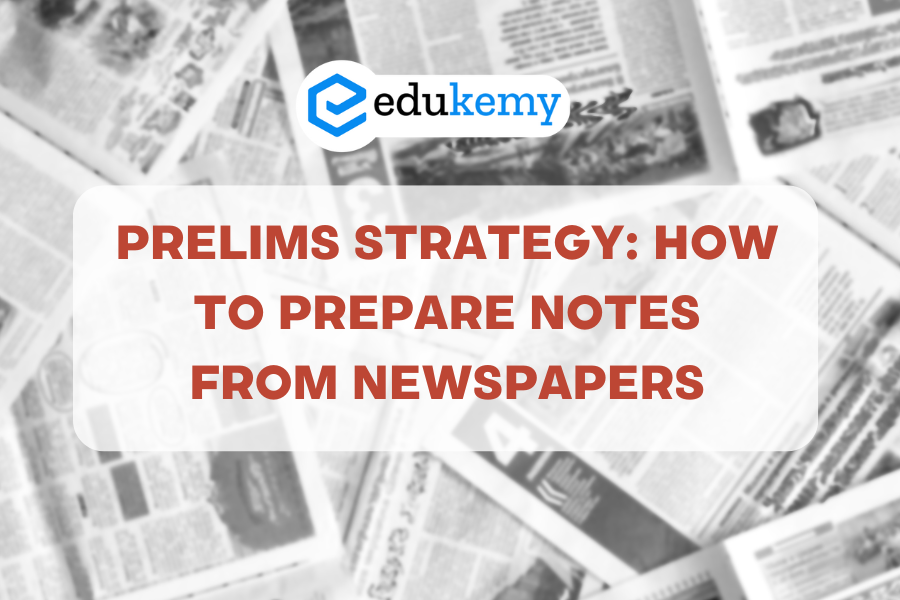Enhance your prelims strategy with effective newspaper note-making. Learn a structured approach to streamline UPSC Prelims & Mains 2025 preparation efficiently!

Contents
Introduction
Newspaper reading is an essential part of UPSC Civil Services Examination (CSE) preparation. However, many aspirants struggle with making effective notes, leading to wasted time and inefficiency. Here’s a structured approach to preparing newspaper notes for both Prelims and Mains 2025.
Why Read Newspapers for UPSC?
- Prelims: Helps in covering current affairs-related MCQs, government policies, international relations, economic trends, and environmental developments.
- Mains: Provides insights for answer writing, essay topics, and relevant examples for General Studies papers.
- Personality Test: Keeps you updated with national and international affairs, enabling a well-informed discussion during the interview.
Which Newspaper to Follow?
- The Hindu or The Indian Express (for quality editorial and factual coverage)
- Business Standard (for economic updates)
- Press Information Bureau (PIB) (for government policies and schemes)
- Rajya Sabha TV debates & Yojana/Kurukshetra magazines (for deeper insights)
How to Read Newspapers for UPSC?
Step 1: Focus on Relevant Sections
- Front Page: Read only major national and international news.
- Editorial & Op-Ed Pages: Important for Mains answer writing and essay preparation.
- National News: Cover Supreme Court judgments, government policies, important committees, and commissions.
- International Relations: Focus on bilateral agreements, global summits, and India’s diplomatic stance.
- Economy: RBI reports, government schemes, inflation trends, fiscal policies, and economic surveys.
- Science & Technology: ISRO launches, AI developments, climate change, and space research.
- Environment: Biodiversity, wildlife conservation, climate agreements, and disaster management.
Step 2: Make Concise and Structured Notes
- Use Digital or Handwritten Notes: Evernote, OneNote, or a dedicated notebook.
- Follow a Subject-Wise Approach: Categorize news into Prelims and Mains-relevant topics.
- Use Bullet Points and Flowcharts: Makes revision easier.
- Avoid Lengthy Notes: Summarize in 3-4 points with key facts.
- Regularly Update Notes: Revise and edit every weekend for better retention.
Step 3: Link Current Affairs with Static Syllabus
- Relate historical judgments with polity.
- Link economic trends with fundamental economic concepts.
- Connect environmental issues with geography and disaster management.
- Use case studies and examples for ethics paper (GS-IV).
Step 4: Use Government Reports & Websites
- NITI Aayog Reports
- Economic Survey & Budget Highlights
- PRS India for policy analysis
- Ministry Websites for authentic data
Step 5: Regular Revision
- Daily: Highlight key points from notes.
- Weekly: Revise compiled notes.
- Monthly: Prepare a summary of crucial topics.
- Prelims Phase: Focus on factual recall.
- Mains Phase: Develop analytical perspectives with answer writing.
Common Mistakes to Avoid
- Spending Too Much Time on Newspapers: Limit reading time to 45-60 minutes.
- Copying Entire Articles: Extract only key facts, analysis, and conclusions.
- Ignoring Editorials: They help in opinion-building and answer writing.
- Not Aligning with Syllabus: Every note should have relevance to UPSC topics.
- Skipping Regular Revisions: Without revision, retention drops significantly.
Conclusion
Effective newspaper note-making is an art that can be mastered with practice. By focusing on UPSC-relevant news, making structured notes, and revising consistently, aspirants can efficiently use newspapers as a powerful tool in their preparation for UPSC Prelims and Mains 2025. Happy studying!
To get free counseling/support on UPSC preparation from expert mentors please call 9773890604
- Join Geography Optional Course – Click Here
- Get Geography Hard Copy notes – Click Here

